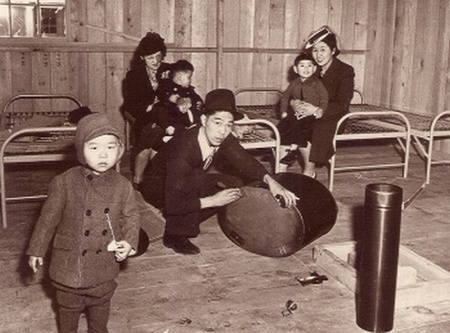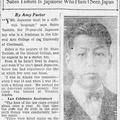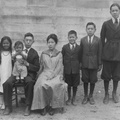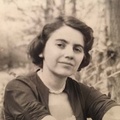Hugh Macbeth, Sr., a Black attorney from Los Angeles, is largely forgotten today, but he deserves commemoration as an outstanding defender of Japanese Americans during World War II. Born in Charleston, South Carolina in 1884, Hugh Ellwood Macbeth attended Fisk University and Harvard Law School, graduating in 1908. After living several years in Baltimore, where he was founding editor of the newspaper The Baltimore Times, in 1913 he headed to California.

The Yoshimura Family Arriving at Camp Harmony, a temporary internment center near Seattle, Washington in 1942. Image Ownership: Public Domain
In the decades that followed, Macbeth became an important player on the Los Angeles legal and political scene. He concentrated on aiding African American litigants and criminal defendants, and represented such notable clients as jazz great Jelly Roll Morton. Macbeth pressed numerous cases challenging segregation laws and restrictive housing covenants. In 1940, he persuaded the American Legion to cease excluding Black boxers from fight cards at Hollywood Legion Stadium. Yet Macbeth’s firm had many white clients, and he remained active in the larger society. In 1934 Macbeth was named general counsel for the Utopian Society, a largely-white economic reform group that claimed 600,000 members. Although Macbeth’s reaching beyond the Black community drew criticism, his broad connections led to his being named resident consul for the Republic of Liberia in 1936. Two years later, when Governor Frank Merriam created the state Race Relations Commission, Macbeth, who had drafted the law establishing the commission, was named Executive Secretary and sole Black Commissioner.
Macbeth maintained close contacts with Japanese Americans. He settled in L.A.’s Jefferson Park, then largely Japanese. Macbeth’s son Hugh, Jr., who later became his law partner, recalled that as a child he attended Japanese school with his Nisei pals after school, since otherwise he had nobody in the neighborhood to play with. There Hugh, Jr. studied Japanese language and judo (and also absorbed community prejudices against Chinese and Filipinos!). Meanwhile, the Macbeth family informally took in an orphaned Nisei, Kenji Horita.
In early January 1942, shortly after Pearl Harbor, Macbeth travelled to Guadalupe and Santa Barbara, CA to investigate the cases of Issei rounded up by the government during December and interned in Missoula, Montana. Following interviews with the internees’ families, he discovered that those taken were prosperous farmers, and that there was no evidence of sabotage. He swiftly concluded that the removal was engineered by white agricultural interests anxious to grab the Issei farmers’ land. Outraged, Macbeth turned to organizing support for Japanese Americans among liberal and church groups. Thanks to Macbeth, the California Race Relations Commission and the Santa Barbara Minister’s Alliance would become the only two Southern California organizations to officially oppose evacuation.
Macbeth simultaneously organized efforts nationwide. He corresponded with Socialist leader Norman Thomas, who used the information Macbeth provided in newspaper articles and radio speeches denouncing Executive Order 9066. Macbeth later cosigned Thomas’s pamphlet, “Democracy and the Japanese Americans.” The pamphlet—widely distributed by the Japanese American Citizens League—denounced the government’s policy as “totalitarian justice” and called for an end to evacuation and for reparations.
The announcement of Executive Order 9066 on February 19, 1942 was a blow to Macbeth. On February 22 he sent President Roosevelt a telegram, asking him, now that his order had allayed fears of sabotage, to permit “liberty-loving Japanese” to resume their agricultural activities “under military surveillance and with government assistance.” Meanwhile, he spoke privately of his grief at families being “torn up by the roots” and sent off from their homes “they know not where.” In March 1942, he wrote General John DeWitt to propose that loyal farmers be permitted to form cooperatives and establish colonies in Utah. (The plan was designed by Hi Korematsu, whose brother Fred would soon challenge evacuation). Macbeth proceeded to lecture the General that removal reflected “general and deep seated American racial prejudice against orientals and particularly against Japanese.” Not unexpectedly, DeWitt failed to reply.
In May 1942, Macbeth visited Santa Anita Assembly Center with his wife and brother to see friends and collect information on conditions. Shortly afterwards, he travelled to Washington to brief Justice Department officials on Japanese Americans. (Using a White House cook as a back channel, Macbeth attempted without success to secure a meeting with President Roosevelt in order to lobby for an executive order making racial discrimination a military offense.)
Upon returning to California, Macbeth joined ACLU attorney A. L. Wirin in defending Ernest and Toki Wakayama. Ernest Kinzo Wakayama, born in Hawaii in 1897, was a union official, World War I veteran, and officer of the American Legion, while Toki was a Nisei from California. The Wakayamas filed habeas corpus petitions asserting that there was no military necessity for evacuation and that DeWitt’s exclusion order was arbitrary and a violation of rights. In October 1942, a three-judge panel heard the petitions. In his supporting brief and in oral argument, Macbeth charged that race-based confinement constituted unconstitutional discrimination. On February 4, 1943, the judges granted a writ of habeas corpus. However, by that time the Wakayamas, worn down by large-scale beatings and ostracism at the Manzanar camp, had withdrawn their suit and requested “repatriation” to Japan.
Despite this defeat, Macbeth continued to defend Japanese Americans. He repeatedly wrote WRA Director Dillon Myer with advice. At a public forum in Los Angeles in April 1943, he bravely spoke out in favor of letting Japanese Americans return to the West Coast. In 1944, he signed the JACL brief in the historic case of Korematsu v. United States. Shortly afterward, he travelled to the Amache camp to counsel families of Nisei draft resisters. When Chiyoko Sakamoto, the first Nisei woman to be admitted to the Bar, returned from camp in mid-1945 and was unable to find work, Macbeth hired her as his associate.
In 1945, Macbeth and his son Hugh, Jr. joined JACL counsel A.L. Wirin in the case of Fred and Kojiro Oyama, who challenged California’s Alien Land Act. In February 1945, People v. Oyama was argued in the San Diego County Superior Court. Wirin and Macbeth argued that alien land laws were out of date and penalized the defendants solely because of race. The judge ruled against the Oyamas, at which point Macbeth withdrew from the case. However, the decision was appealed, and ultimately reached the US Supreme Court. In January 1948 the High Court granted victory to the Oyamas. Oyama v. California not only ended all enforcement of the Alien Land Act, but furnished an important precedent for later rulings striking down racial segregation.
Hugh Macbeth died in 1956. Although his career is obscure, his passion for justice remains inspiring.
*This article was originially published in the Nichi Bei Times on June 7, 2007 and is the basis for the chapter, “The Los Angeles Defender” in Greg Robinson’s book, After Camp.
© 2007 Greg Robinson





